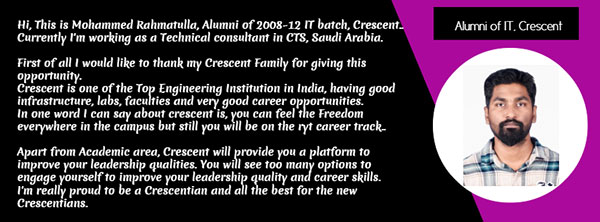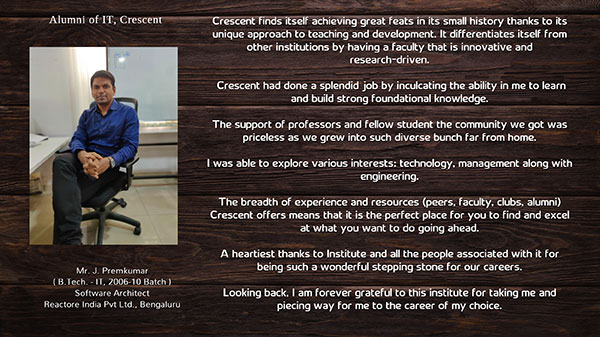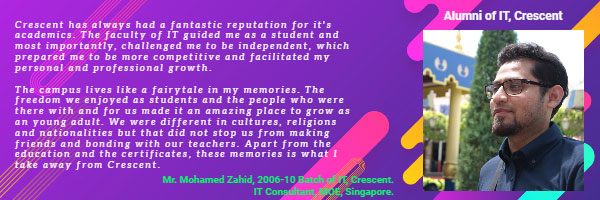B. Tech. Information Technology
B. Tech. INFORMATION TECHNOLOGY
B.Tech. Programme
- Candidates should have passed 12th standard examination conducted by State Board / CBSE / ISC or equivalent examination with a minimum aggregate of 50% marks in Physics, Chemistry and Mathematics.
- Candidates should have appeared for the Crescent Institute Engineering Admission Test (CIEAT 2026) or should have a valid score in JEE (Main).
- Candidates who have studied in Regular, Full time and Formal Education alone are eligible to apply.
- Age Limit: The date of birth should be between January 2004 and December 2009.
CIEAT 2026 – Crescent Institute Engineering Admission Test
Selection Process
Candidates will be selected for admission to B.Tech. Programme of all branches of study based on the merit in the qualifying examination and the marks scored in the Crescent Institute Engineering Admission Test (CIEAT-2026). Candidates having a valid score in JEE (Main) will be directly selected for admission.
CIEAT-2026 is an all India level Admission Test conducted for selecting the candidates for admission to B.Tech. Programmes.
Date of online Test: 25th April 2026
Applications are invited from prospective Candidates.
For Assistance
Help Desk : +91 95432 77888
e-mail : admissions@crescent.education
Admission 2025-26
| B.Tech. Programme | |||||||
|---|---|---|---|---|---|---|---|
| Sl. No | Name of the Programme | Tuition Fee Per year based on % of Marks in Maths, Physics & Chemistry in 12th Standard Exam (INR) | Amenities and Service Fee (INR) (One–time) | ||||
| 90% and above | 80 to 89.99% | 70 to 79.99% | 60 to 69.99% | Below 60% | |||
| 1 | Information Technology | 1,25,000 | 1,75,000 | 2,00,000 | 2,50,000 | 3,00,000 | 40,000 |
Admission Brochure
Programme Educational Objectives
The Programme Educational Objectives for students of B.Tech – Information Technology Programme within the first few years after graduation are that they will
- have core competence in mathematics, science and engineering concepts essential to formulate, analyze and solve hardware / software engineering problems
- possess good breadth of knowledge in the core areas of information technology and related engineering so as to comprehend engineering trade-offs, analyze, design and synthesize data and technical concepts to create novel products and solutions for the real time problems
- use tools and techniques for software development in different application domains and to grow as an entrepreneur.
- apply their knowledge and multifaceted skills to get immediate employment and excel in IT professional careers or awareness of the lifelong learning needed to continue their education in IT or related post graduate programmes to perform excellence, leadership and demonstrate good citizenship.
- maintain high professionalism and ethical standards, effective oral and written communication skills, to work as part of teams on multidisciplinary projects and diverse professional environments, and relate engineering issues to the society, global economy and to emerging technologies.
Programme Outcomes
On successful completion of the programme, the graduates will be able to:
- apply the knowledge of mathematics, science, engineering fundamentals, and an engineering specialization to the solution of complex engineering problems
- identify, formulate, review research literature, and analyze complex engineering problems reaching substantiated conclusions using first principles of mathematics, natural sciences, and engineering sciences
- design solutions for complex engineering problems and design system components or processes that meet the specified needs with appropriate consideration for the public health and safety, and the cultural, societal, and environmental considerations
- use research based knowledge and research methods including design of experiments, analysis and interpretation of data and synthesis of the information to provide valid conclusions
- create, select, and apply appropriate techniques, resources, and modern engineering and IT tools including prediction and modeling to complex engineering activities with an understanding of the limitations
- apply reasoning informed by the contextual knowledge to assess societal, health, safety, legal and cultural issues and the consequent responsibilities relevant to the professional engineering practice
- understand the impact of the professional engineering solutions in societal and environmental contexts, and demonstrate the knowledge of, and need for sustainable development
- apply ethical principles and commit to professional ethics and responsibilities and norms of the engineering practice
- function effectively as an individual, and as a member or leader in diverse teams, and in multidisciplinary settings
- communicate effectively on complex engineering activities with the engineering community and with society at large, such as, being able to comprehend and write effective reports and design documentation, make effective presentations, and give and receive clear instructions
- demonstrate knowledge and understanding of the engineering and management principles and apply these to one‘s own work, as a member and leader in a team, to manage projects and in multidisciplinary environments
- recognize the need for, and have the preparation and ability to engage in independent and life-long learning in the broadest context of technological change
Programme Specific Outcomes
- design and conduct experiments for organizing, analyzing, interpreting data to develop skills related to information retrieval
- identify, formulate and solve computing problems using appropriate tools & techniques to meet industrial and societal needs in different domains
Alumni Video Testimonial
Alumni Testimonial








